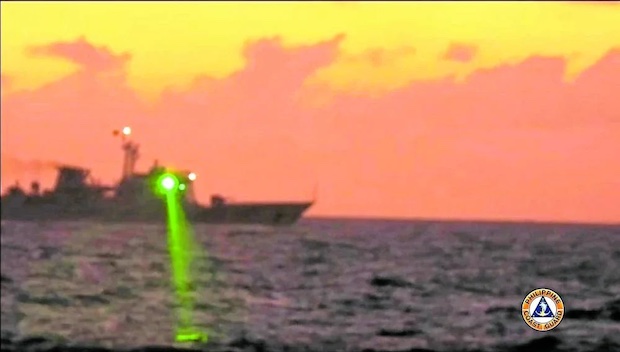
NEW TACTIC | China Coast Guard Vessel No. 5205 is shown directing a laser beam at BRP Malapascua where this photo was taken on Feb. 6, 2023. (Photo from the Philippine Coast Guard)
MANILA, Philippines — The Philippine Coast Guard (PCG) has accused a Chinese coast guard ship of directing a “military-grade” laser at one of its vessels, putting the Filipino crew in danger.
The PCG vessel was supporting a rotation and resupply mission of the Philippine Navy in Ayungin (Second Thomas) Shoal in the West Philippine Sea on Feb. 6.
The China Coast Guard (CCG) ship with bow No. 5205 illuminated a green light twice toward the BRP Malapascua, causing temporary blindness to crew members on duty at the bridge or main command center at past 6 p.m. as the ship reached 19.5 kilometers (10 nautical miles) from the shoal, the PCG said.
“The PCG condemns any actions that harm and jeopardize the safety of everyone regardless of nationality,” PCG commandant Adm. Artemio Abu said.
The Chinese ship crossed the bow of the PCG ship at a distance of 7.4 km (4 nautical miles), as if to warn BRP Malapascua to stop or alter course.
This was followed by “dangerous maneuvers,” with CCG 5205 a close distance of about 150 yards from the starboard quarter of the Philippine vessel before the Chinese ship shone its laser.
Radio challenges were exchanged throughout, with the Chinese coast guard warning the Philippine ship that it was “in the jurisdiction of the People’s Republic of China.”
Ayungin Shoal, a submerged reef 194 km off Palawan province, is within the Philippines’ exclusive economic zone where the Philippine Navy maintains its presence through the decrepit BRP Sierra Madre.
China, however, claims almost all of the South China Sea, including the West Philippine Sea.
The Regional Coordinating Center in Palawan ordered the BRP Malapascua to alter its course and support the BRP Teresa Magbanua for the PCG’s own resupply mission to its substations in the Kalayaan Island Group.
‘ACT OF PROVOCATION.’ | A crew member of the China Coast Guard vessel 5205 removes the cover of a 70 mm cannon and aims it toward the BRP Teresa Magbanua near Ayungin Shoal in the West Philippine Sea in August 2022. (File photo from the Philippine Coast Guard)
‘Shadowed and harassed’
Commodore Jay Tarriela, PCG adviser of the commandant for maritime security, told the Inquirer that the temporary blindness of the crew on duty lasted for about 10 to 15 seconds, “but we don’t know if it would cause long-term medical effects.”
It was not the first time that China directed a laser beam at a Philippine ship, he said.
In June last year, the PCG tugboat BRP Habagat, while 10 nautical miles north of the Philippine-occupied Panata (Lankiam Cay) Island, was “shadowed and harassed” by a People’s Liberation Army Navy vessel.
The Chinese navy ship directed its searchlight at BRP Habagat for 20 minutes and flashed “blue-colored lights with blinkers” at the tugboat’s bridge, which also resulted in momentary blindness and skin itchiness among the crew on duty, Tarriela said.
The reported incidents, disclosed to the public for the first time, follow a pattern of Chinese forces harassing other countries with lasers.
Last year, the Australian government said a Chinese warship aimed its laser at a Royal Australian Air Force jet 105 km from Australia’s northern coast. But China denied this.
‘ACT OF PROVOCATION.’ Closer view of a crew member of China Coast Guard vessel 5205 removing the cover of a 70-mm cannon and aiming it at the BRP Teresa Magbanua near Ayungin Shoal in the West Philippine Sea in August 2022.(File photo from the Philippine Coast Guard)
Blockade
Beijing has been trying for years to prevent the Philippine Navy’s resupply missions in Ayungin Shoal and has displayed new tactics over the past few months.
Except for the small wooden boats chartered by the Navy, the CCG has been preventing Philippine military and law enforcement vessels from entering the shoal.
Back in August, the same Chinese coast guard ship that struck a laser at the Philippine ship last week, removed the cover of its 70 mm naval gun after BRP Teresa Magbanua— which was providing escort to a Philippine Navy resupply mission in Ayungin Shoal at the time—crossed the blockade created by Chinese vessels.
“We see it as an act of provocation,” Tarriela said.
The PCG ship was approaching 24 km (13 nautical miles) from the BRP Sierra Madre when the Chinese coast guard ship, accompanied by two maritime militia vessels, started blocking its path to prevent it from coming close to the Navy troops.
Tarriela said it became evident that the Chinese militia, which were ostensibly engaged in fishing, were also clearly taking orders from the CCG. The militia vessels even deployed their utility boats to support the blockade and shadowing by the Chinese coast guard, he said.
‘Sustain our presence’
Despite the “dangerous maneuvers and aggressive actions at sea” by the CCG, Abu said the PCG “will always be in the West Philippine Sea to sustain our presence and assert our sovereign rights.”
The government has been protesting the harassment, but with very little reaction from China.
Since 2016, the Philippines filed 461 diplomatic protests against China over the latter’s aggression in the West Philippine Sea, according to the Department of Foreign Affairs.
As of Jan. 26, it said there were 262 diplomatic protests lodged from 2016 to 2021, 195 in 2022, and four so far in 2023.


